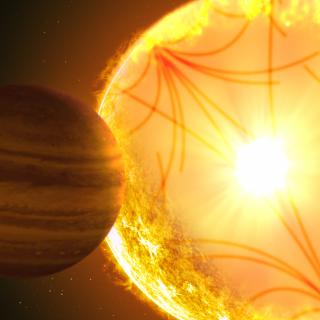Bibcode
White, Timothy R.; Bedding, Timothy R.; Stello, Dennis; Appourchaux, Thierry; Ballot, Jérôme; Benomar, Othman; Bonanno, Alfio; Broomhall, Anne-Marie; Campante, Tiago L.; Chaplin, William J.; Christensen-Dalsgaard, Jørgen; Corsaro, Enrico; Doğan, Gülnur; Elsworth, Yvonne P.; Fletcher, Stephen T.; García, Rafael A.; Gaulme, Patrick; Handberg, Rasmus; Hekker, Saskia; Huber, Daniel; Karoff, Christoffer; Kjeldsen, Hans; Mathur, Savita; Mosser, Benoit; Monteiro, Mario J. P. F. G.; Régulo, C.; Salabert, David; Silva Aguirre, Victor; Thompson, Michael J.; Verner, Graham; Morris, Robert L.; Sanderfer, Dwight T.; Seader, Shawn E.
Referencia bibliográfica
The Astrophysical Journal Letters, Volume 742, Issue 1, article id. L3 (2011).
Fecha de publicación:
11
2011
Número de citas
55
Número de citas referidas
48
Descripción
Photometric observations made by the NASA Kepler Mission have led to a
dramatic increase in the number of main-sequence and subgiant stars with
detected solar-like oscillations. We present an ensemble asteroseismic
analysis of 76 solar-type stars. Using frequencies determined from the
Kepler time-series photometry, we have measured three asteroseismic
parameters that characterize the oscillations: the large frequency
separation (Δν), the small frequency separation between modes
of l = 0 and l = 2 (δν02), and the dimensionless
offset (epsilon). These measurements allow us to construct asteroseismic
diagrams, namely the so-called Christensen-Dalsgaard diagram of
δν02 versus Δν, and the recently
re-introduced epsilon diagram. We compare the Kepler results with
previously observed solar-type stars and with theoretical models. The
positions of stars in these diagrams places constraints on their masses
and ages. Additionally, we confirm the observational relationship
between epsilon and T eff that allows for the unambiguous
determination of radial order and should help resolve the problem of
mode identification in F stars.
Proyectos relacionados

Sismología Solar y Estelar y Búsqueda de Exoplanetas
Los objetivos principales de este proyecto son: 1) estudiar la estructura y la dinámica del interior solar, 2) ampliar este estudio a otros tipos de estrellas y 3) buqueda de planetas extrasolares utilizando métodos fotométricos y su caracterización con información complementaria (espectrometría). Para alcanzar el primer objetivo, utilizamos la
Savita
Mathur